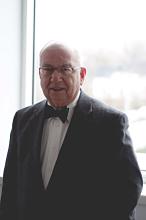Robert Geho (MGT ’94) wasn’t planning on following in his father’s footsteps. Fortunately, his musical training prepared him to improvise and write an entirely different soundtrack for his life.
He had planned for a career in orchestral conducting and, after earning a Bachelor of Music degree from Cleveland Institute of Music through a joint program at Case Western Reserve University, Geho began work on an MBA at Weatherhead School of Management. Then, some unexpected news landed like a wrong note.
Geho was diagnosed with type 1 diabetes—a condition in which the pancreas creates little to no insulin, leading to high blood sugar levels and a series of dangerous and life-threatening symptoms.
Coincidentally, Robert’s father, Blair (GRS ’64, pharmacology; MED ’66), had already dedicated his career to research and development of diabetes drugs—studying at CWRU under Earl Sutherland, recipient of the 1971 Nobel Prize in Physiology or Medicine for the discovery of the role of cyclic adenosine monophosphate (AMP) in metabolic processes.
As Robert Geho began to confront his diagnosis, and was about to graduate from Weatherhead School, his father made an interesting offer: to join him in his work to combat diabetes.
“(My father) was embarking on some new entrepreneurial things in the life sciences.” Robert Geho said. “He suggested if I had an interest in diabetes research, given my situation, moving away from a planned career in classical music to give some focus to that.”
While skeptical, the younger Geho accepted the offer. “I almost jokingly said: ‘Sure, Dad. I’ll give you six months, we’ll write a business plan together and work with some other folks on this.’”
The two would found Diasome Pharmaceuticals in 2004.
Today, the company develops treatments for diabetes, obesity and other metabolic disorders through the Hepatocyte Directed Vesicles (HDV) Cell Targeting System. Hepatocytes are the major functional cells of the liver.
Recently, the company closed a round of funding, which included participation from Eli Lilly and Co., one of the world’s leading insulin manufacturers. The financing will fuel a randomized controlled trial to investigate the effects of the Diasome’s HDV Insulin—formulated to be easier to dose than current insulin formulations, and as a result, reduce the risk of hypoglycemia or dangerously low levels of blood sugar.
“My father’s focus has been on the physiology and design of it,” Robert Geho said. ”And my focus has been the business side of things and fundraising.”
While his career path was directed by the unexpected, Robert Geho credits CWRU and Weatherhead School for preparing him to meet the moment.
“An MBA from Weatherhead (School) was really important for someone who ended up in a venture-backed life sciences business venture,” he said. “It was critical for preparing me for the basics of business development, business administration and organizational behavior. I look back on those experiences as having been formative for me, especially coming out of a non-business undergraduate program.”



